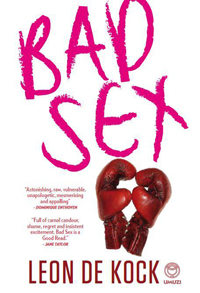Launch of Leon de Kock’s Bad Sex, Friday 9 September, Kalk Bay Book Shop, Kalk Bay.
By Danson S. Kahyana
Prize-winning poet, writer, translator and academic Leon de Kock launched his debut novel, Bad Sex, at Kalk Bay Books on 9 September. The launch was well-attended and featured a conversation with De Kock facilitated by playwright and novelist Jane Taylor. The conversation provided insight into De Kock’s position on white masculinity, the creative writing process, and the link between writing and translation.
Taylor opened the conversation with a comment on the title of the book. “I cannot take the book to the gym because I would be assaulted in most unpredictable ways,” she stated, sending the audience into gales of laughter.
 “So the book has to be read in a brown paper cover. How did the title occur to you?” she asked.
“So the book has to be read in a brown paper cover. How did the title occur to you?” she asked.
De Kock said he chanced upon the title late in the writing of the novel and found it to be just perfect. “It’s a sort of sticky signifier,” he said, causing more laughter. “There is something in it that is almost yuk. The huge risk I was taking in this thing [writing a book on sex and using this title] was precisely that – the point at which people might start saying ‘yuk’,” he said.
When asked why he chose to write about sex and sexual politics, De Kock explained that there was little fiction about sex from a man’s point of view. The invention of Sammy was therefore an effort at speaking into a space that has received little attention from male writers. “Writing for me is about opening spaces that have been occluded in discourse,” he stated.
Asked whether the book was autobiographical, De Kock said it was a “fabricated memoir”. “There is quite a lot of Sammy that is me, but there is also quite a lot that is not me, and I am not telling which is which,” he said. Therapy, he said, was one of the things he shared with Sammy. “I have been to many therapists over the years and I have finally given up.”
Responding to a query regarding the link between his work as a translator and creative writing, De Kock noted that “[t]ranslation warms you up for writing: it takes you into the scene of writing; you have to make critical decisions about where to place words, where to place phrases, how to weigh them out and balance them in order to gain maximum effect,” he said, adding that the act of writing was itself a form of translation since it turned the obscure into something understandable. He hoped to encourage more of his graduate students to join him in the field of literary translation.
He also observed that writing was a form of revenge – revenge against everything in the world that rendered one obscure, rendered the understanding of one as a person obscure, and rendered other people’s understanding of other people wrong.
When asked to share the challenges he experienced while writing the book, De Kock emphasised the rewriting and editing stages as the most nightmarish. He said he had lost over 5000 words (about 15 pages) in the final editing stages.
Some members of the audience were uncomfortable with certain aspects of the novel, most prominently those dealing with Sammy’s presumed ‘misogyny’ and his affair with Felicia, the Hillbrow prostitute. De Kock suggested that to approach these issues, the reader needed to pay attention to the narrative framing of events and the social context in which Sammy grew up and how it motivated his views and actions.
He paid tribute to South African writer Stephen Gray for inducting him, as a graduate student, into the world of writing and writers. “I came into the discipline of literature from a writer’s point of view – from the point of view of the challenges and pleasures of writing,” he said.
Towards the end of the conversation, he expressed a concern: to him, literary critics were deserting creative writers and shifting attention to post-disciplinary areas of study like transnationalism. “Writers are largely being poorly received or not being received within a full literary-historical approach, which is an unhappy situation for writers and the project of writing,” he stated.
De Kock read a short excerpt from the book and autographed copies bought at the launch.
 SLiPStellenbosch Literary Project
SLiPStellenbosch Literary Project